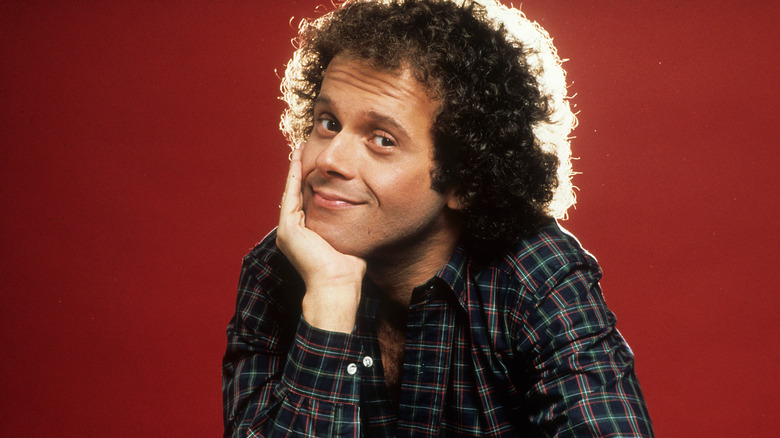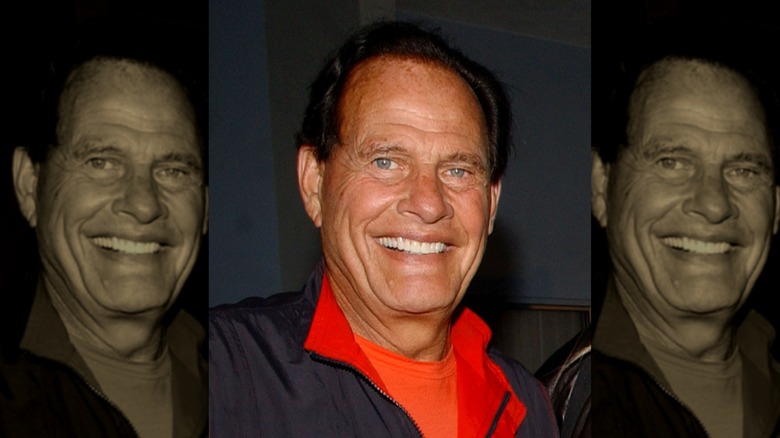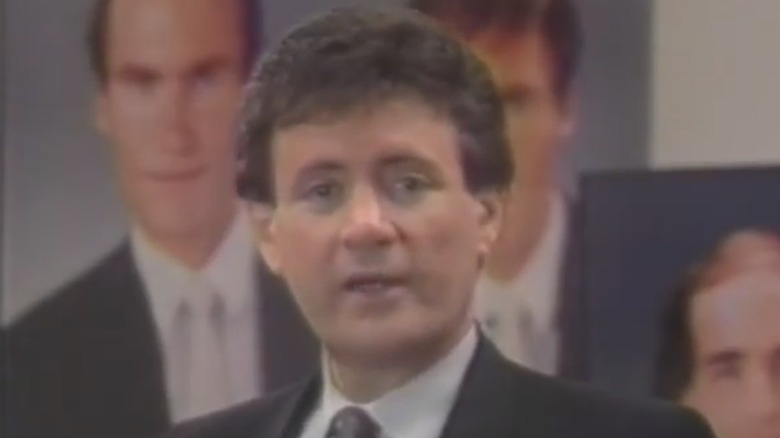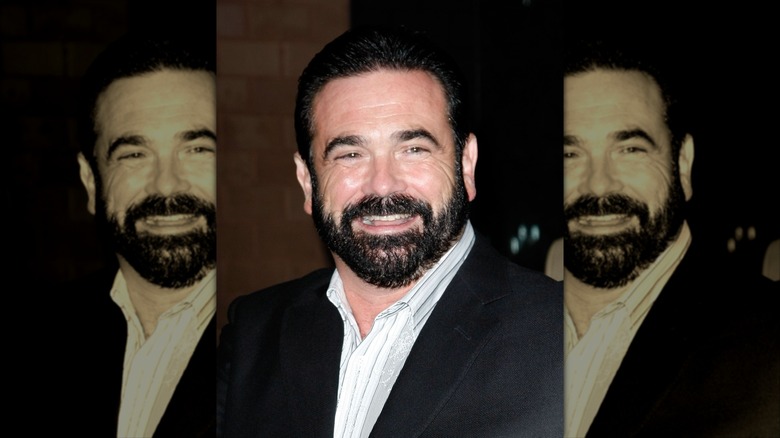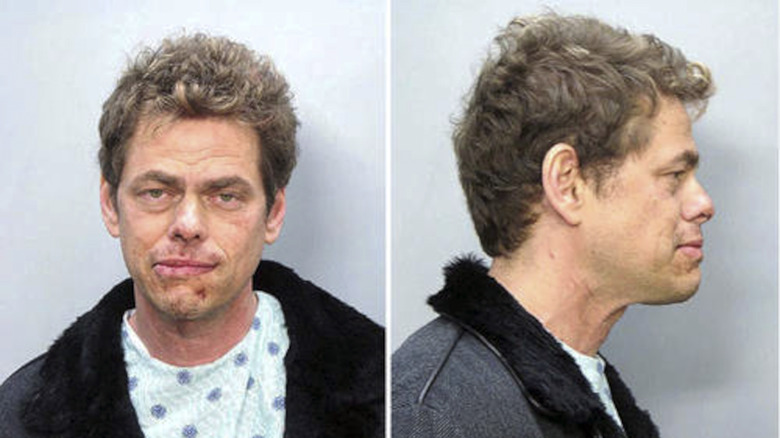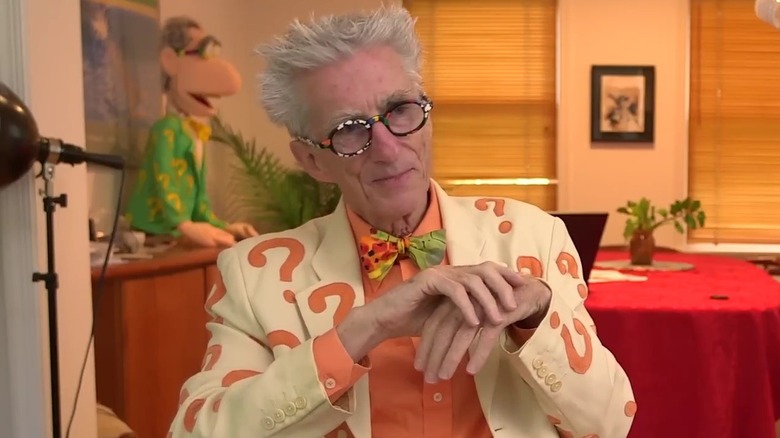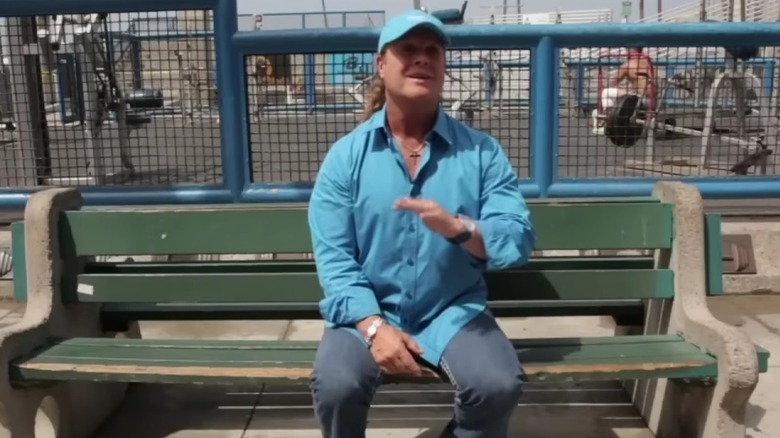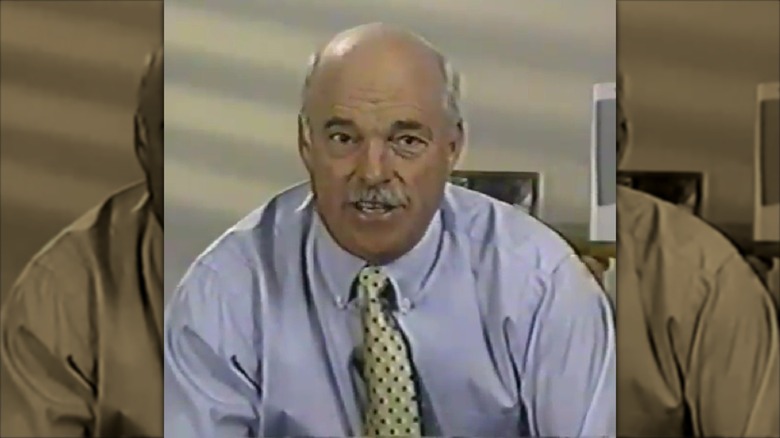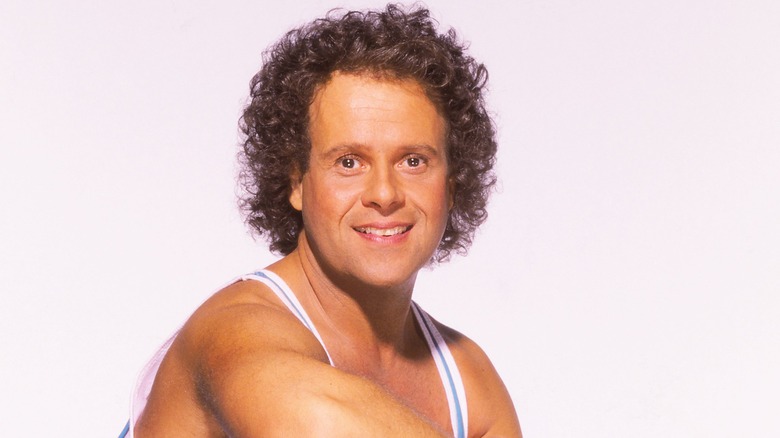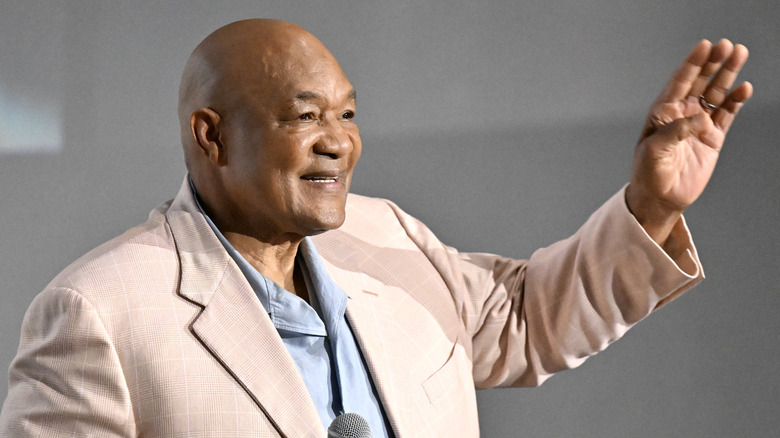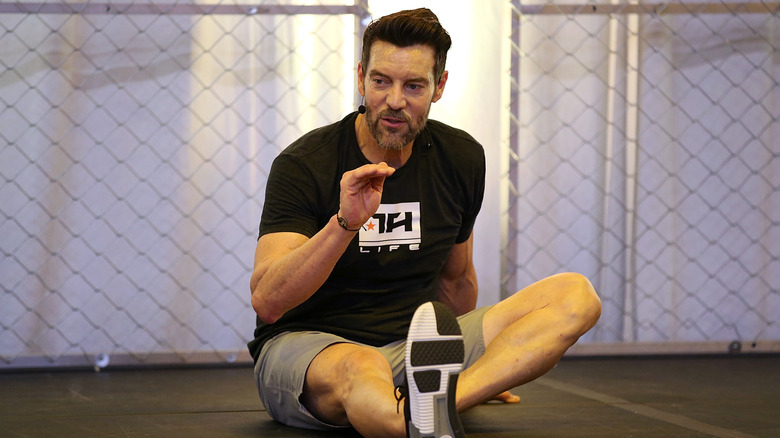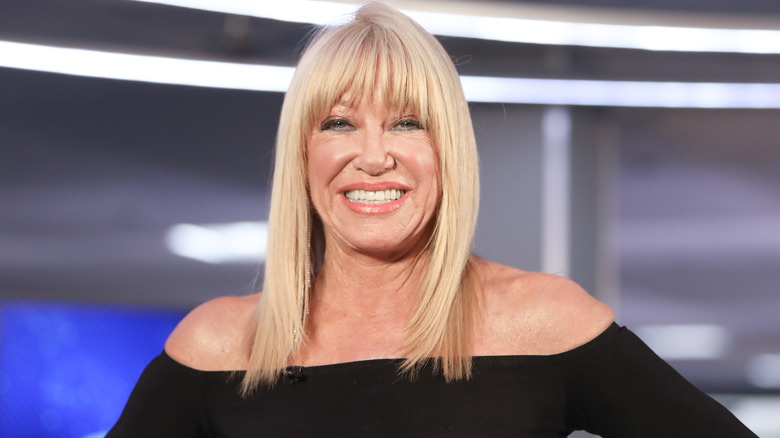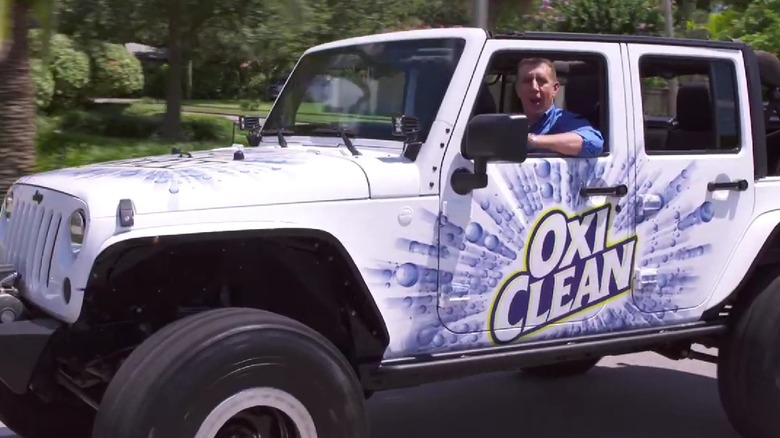Whatever Really Happened To These Infomercial Stars?
If you ever had occasion to spend a sleepless late night in front of the television in the '80s or '90s, then you may have fallen under the charms of one of the period's many, many infomercial stars: folks whose business was show, and what they were there to show you was their dazzling, nay, life-changing products. Between all the B-movies and syndicated re-runs you may have been tempted to switch to, the best of those pitchers knew how to weave their spell. They could, as the saying goes, sell ice to a penguin, and their schtick could be as entertaining as anything else on the tube in the wee hours (or even more).
Infomercials are nowhere near as ubiquitous as they used to be, and this generation of pitch professionals has a wealth of digital platforms — YouTube, TikTok, Snapchat, etc. — on which to hawk their wares. But if the infomercial kings and queens of yore still have a special place in your heart, you may be interested to know what became of them after their glory days expired like a one-time-only two-for-one offer. Here's what happened to some of your favorite infomercial stars of late nights gone by.
Ron Popeil
There are many princes and princesses of the infomercial, but there is and always will be one infomercial king: Ron Popeil, the founder of Ronco and the pioneer of the infomercial form. Heck, even before infomercials existed, Popeil was playing out his routine on Chicago street corners: Using his booming voice and charismatic persona, Popeil hawked the Chop-O-Matic, a food processor invented by his father, Sam Popeil, an inventor whose inspirations would become some of his son's most famous products.
Those products — the Veg-O-Matic, the Smokeless Ashtray, the Food Dehydrator, the Pocket Fisherman, and more — have become the stuff of legend, and one or more of them may have graced your household at some point or another. Also legendary, and part of the cultural zeitgeist, are his many catchphrases: "Now how much would you pay," "But wait — there's more," "Set it and forget it," and so many more. Even though his Ronco Teleproducts declared bankruptcy in the '80s, Popeil brought it back from the brink, finding new life for his stable of products (notably the Showtime Chicken Rotisserie) on home shopping networks. He remained a salesman until the end of his life, overseeing his many sales channels, including the Ronco website, which you can still purchase products from today. Popeil died in 2021 at the age of 86.
Sy Sperling
Way back in the day, if you were losing your hair, there was pretty much only one way to cover it up, literally: with a hairpiece, also known as a toupee. Such was the stigma surrounding male hair loss that it was considered to be in poor taste to even discuss it. That is, until Sy Sperling came along.
Sperling was not an actor and never had any ambition to achieve fame, he was just a salesman with a dome that had seen increasing exposure to the elements since his late 20s. But, overcoming his insecurity and lack of on-camera experience, in the early '80s, Sperling decided to get in front of the camera for his company, Hair Club for Men, which sported an array of treatment options for thinning hair.
Sperling's earnest delivery resonated with audiences, as did his before-and-after pictures accompanied by his legendary kicker: "Remember, I'm not only the Hair Club president, but I'm also a client." The spots blasted the Hair Club into the stratosphere, and today, the company is still going strong. Sperling eventually sold the company and in his later years, he hosted a radio show called "How to Succeed in Business," made the rounds as a popular guest on late-night talk shows, and wrote a regular column for the Hair Society website. Sperling died in 2020 at the age of 78.
Billy Mays
There are born pitchmen, and then there is Billy Mays, who might just have exited the womb extolling the virtues of various cleaning products to his bewildered mother. The personable, ultra-high energy Mays was a pioneer of a new type of infomercial: a short, several-minute-long blast of information designed not to hold viewers' attention for the length of a sitcom episode, but to get them in the mood to buy on the spot. Few pitchmen were ever able to hit that sweet spot like Mays, who was dubbed the latter-day "Informercial King" for a reason.
Along with his partner and heir-apparent Anthony Sullivan, Mays came into viewers' homes with a promise: buy this product (almost always of the household cleaning variety), and your life will change. Viewers believed him; between products such as OxiClean, Zorbeez, and Orange Glo, his infomercials generated north of $1 billion in sales over a few short years. Unfortunately, Mays was still going strong when he was taken from late night audiences while still in his prime. In 2009, Mays died in his sleep from a heart attack; he was only 50 years old. On her website, PR professional Marian Salzman credited Mays with helping integrate the infomercial into pop culture at large, and wrote that he "will be remembered as the Dean of Salesmanship" (via The Economist).
Vince Offer
In 2006, bleary-eyed late-night viewers were introduced to the ShamWow — a seemingly magical chamois that could hold many times its weight in liquid, and which could be used to clean up, well, a virtual lake of spilled milk. Hawking this product was Offer Shlomi, also known as Vince Offer, also known as the "ShamWow Guy," whose energy level and screen persona could best be described as "barely contained mania." Offer was no stranger to slinging products: along with the Slap Chop, a veggie chopping device, he had been selling the ShamWow flea markets and other such venues for years. Eventually, he saved enough to produce a low-budget TV spot, and purchased air time in the wee hours of the morning on Comedy Central — which, given his irreverent delivery, proved to be a genius move.
Offer claimed to have sold millions of dollars worth of products over the next several years, but in 2009, his streak came to a halt in bizarre fashion. Offer was arrested after getting into a literal fistfight with a sex worker, but since both were found to be equally culpable in the brawl, no charges were filed against either. In 2013, Offer told NBC News that the incident "probably saved [his] life," putting an end to his hard-partying ways — but his career never recovered. Offer faded from the limelight, and a 2023 attempt to reinvent himself as a right-leaning podcast host — tackling such scintillating topics as "wokeism" and "the LGBTQ agenda" — fortunately went nowhere.
Matthew Lesko
Taking to the airwaves to sell money may seem a little counterintuitive, but don't tell that to Matthew Lesko, the "Free Money Guy." Capering manically while looking like a cross between Doc Brown from "Back to the Future" and the Riddler, Lesko was a staple of light night television in the '90s; he claimed to have researched government grants up one side and down the other for years, and he was ready to sell you the inside info on which of these grants you could qualify for.
Lesko's memorable infomercials dried up after several years, so it may surprise you to learn that he is still doing his thing. As of this writing, the 81-year-old is still insisting to subscribers on YouTube that he has the free money hookup, posting videos with titles like "The Easiest Grant in America" and "6 Websites That Offer Free Money With No Income Requirements." This despite the fact that his info may not, to put it diplomatically, be entirely accurate. In a post on the website of the Allied Grant Writers organization, Lesko was brutally taken to task. "Matthew Lesko is a heinous person preying on the minds of naive grant seekers," it read in part. "The info posted all over his web sites are false and add on the already crowded space occupied by thousands of grant scammers."
Tony Little
Billing himself as "America's Personal Trainer," ex-bodybuilding champ Tony Little began his career in the late '80s, hawking popular exercise videos on Home Shopping Network. He expanded into infomercials in the early '90s, and by the close of that decade, he was selling literal truckloads of his Gold Gazelle Glider, an aerobic workout machine. With a down-to-earth personality and a treasure trove of relatable anecdotes and catchphrases, Little became a celebrity, and not just among the late-night crowd; he's been a regular guest on talk shows and news broadcasts, and has sat for interviews with the likes of USA Today and the New York Times extolling the virtues of regular exercise, according to his website.
In 2018, Little and his ex-wife Melissa opened up on a Today show interview about an extremely personal, extremely trying circumstance: the birth of their twin sons Cody and Chase, who had been born a full three months prematurely in 2009. "I thought I had [faced hardship]," he said. "But no, I hadn't ... [But] I always believed. There's a lot higher percentage of winning when you believe." While Little is no longer a mainstay on the airwaves, his products continue to sell on HSN and on his website.
John Scherer
Back in the '90s, when computers and the internet were looked upon less as a facet of everyday life and more like arcane wizardry, there was no shortage of self-proclaimed gurus promising to make a tech genius out of you in no time. There was only one, however, who appeared on your television screen late at night, looking and sounding for all the world like your smart next door neighbor, who explained in straightforward language how he could demystify the PC and turn that Box of Mystery into a useful tool. His name was John Scherer, but for thousands of customers, he was their actual professor — the "Video Professor," who parlayed his experience in the computer world into a series of successful VHS (and later, CD-ROM) tutorials.
Scherer's business burned brightly for a relatively short time; it quickly became a $100 million company, but somewhat ironically, the constant need to switch formats as computers evolved (and the inability to stick to one pricing plan) crippled it in short order. In 2012, Scherer launched a new product: "Canless Air," a canned air alternative that he sells mainly to corporate customers; he also offers product marketing advice and books speaking gigs.
Richard Simmons
There were few more sunny television personalities than Richard Simmons, and in the fitness-conscious '80s, there were few pitchmen more suited to become an icon. Along with Jane Fonda, Simmons sold aerobics to the public as a fun, beneficial workout that could easily be done in the privacy of one's own home — especially while grooving to "Sweatin' to the Oldies," "Dance Your Pants Off," or another of his 65 workout videos. Simmons had begun his career in the '70s as an in-person instructor, one of the few with programs tailored to clients of every age and fitness level — but his blindingly upbeat personality made him a perfect fit (no pun intended) for TV.
In recent years, Simmons had become increasingly reclusive, and mounting rumors and speculation about his health culminated in a documentary, "TMZ Investigates: What Really Happened to Richard Simmons," in 2022. The doc claimed that, beset with knee problems, Simmons had chosen to retire from the public eye rather than be remembered as anything other than the vibrant, youthful man he once was, and that same year, Simmons posted a message to his Facebook thanking fans for their support. He remained active on that platform to the end of his life; in 2024, Simmons died at home at the age of 76.
George Foreman
"Big George" Foreman is as legendary as boxers get. He is a two-time heavyweight champion who secured that title for the second time at 45, the oldest man to ever do so; his bouts against the likes of Joe Frazier and Muhammed Ali are all-timers, and he is widely considered to be among the greatest boxers of all time. It's somewhat mind-boggling, then, to realize that he is perhaps even better known for his second career: as a television pitchman, hawking the George Foreman Grill, an ingenious device that you may very well have in your home right now.
The grill was actually the brainchild of inventor Michael Boehm, and the way it works is pretty simple. It's basically a two-sided, clamshell-style grill on a slant, which immediately drains the fat from cooking meat and renders it leaner, and therefore healthier, to consume. Boehm sold his product to Salton, Inc., which hired Foreman to hawk the grill beginning in 1995 — an endeavor that earned Foreman more cash than his boxing career ever did, and ensured that he'd be a household name pretty much forever. These days, Foreman is living the life of a retiree, and commands a hefty fee for speaking engagements.
Tony Horton
If you're a fitness buff, chances are that at some point, you've given the P90X system — created by fitness expert Tony Horton — a day in court. The resistance-based workout system uses simple accessories to construct a challenging workout at home, and Horton baked in elements meant to defeat the more discouraging aspects of exercise, such as repetition and plateauing at a certain level of fitness. Horton sold over 4 million copies of the original program before updating it with a second edition in 2012, and even today, he remains completely dedicated to spreading the gospel of hardcore fitness.
After updating P90X for a third time, Horton in 2019 debuted an all-new program, which he calls "PowerSync 60." According to his website, the purpose of this program is to "[teach] men and women how to exercise with their hormones, rather than against them," offering solutions for those who can't achieve their desired results on a traditional fitness regimen. Horton is also an instructor on the subscription-based home fitness program Tonal, where he promises to "make even the toughest workout feel fun." In a 2016 HuffPost interview, Horton shared what drives him to share his fitness philosophy with the world. "Regular fitness creates a diametric shift in attitude about who you are and how you can impact others," he said. "If you aren't afraid to struggle a little bit a few times a week, you develop a different perspective than people who don't."
Suzanne Somers
Suzanne Somers became a megastar in the late '70s and early '80s thanks to her role as Chrissy Snow, the ditzy blonde with a heart of gold, on the classic sitcom "Three's Company." She parlayed that success into an enviable career; she starred in her own one-woman show on Broadway, wrote a series of books on wellness and aging gracefully, and led yet another classic sitcom, "Step By Step," from 1991 to 1998. For some, though, she will always be the face (and, well, thighs) of the Thighmaster, a home workout device for toning thighs which was ubiquitous on late-night TV in the early '90s.
Somers' expressions of pure joy while using the device helped the ad campaign to go viral in the days before that was even a thing, and despite all of her success later in life, her husband Alan Hamel once shared with People that she always knew the Thighmaster would be an essential part of her legacy. "Suzanne told me once, she said, 'I think I'm going to be remembered for the ThighMaster,'" Hamel remembered. "'It's going to be on my tombstone.'" An Emmy-nominated talk show host and YouTuber in her later years, Somers really did do it all; in 2023, she died from breast cancer at the age of 76.
Anthony Sullivan
The protege of the late, great Billy Mays, Anthony Sullivan often appeared hawking cleaning products by his mentor's side on late-night TV spots, and upon Mays' 2009 death, Sullivan took over in earnest. In an interview with The Futon Critic in 2010, Sullivan described how the transition came less naturally than one might think. "I [didn't] even know if I [wanted to take over], I don't know if we can do it," he said. "It was a very real question but I had to mourn the loss of a friend like anyone does." Pitching products, though, is in Sullivan's blood, and before long, he was driving the famous OxiClean Jeep in his friend's stead.
In a 2017 sitdown with HuffPost, Sullivan shared the secret to his success, one which may seem simple but is nonetheless crucial. "You will sell nothing without enthusiasm," he said. "People may be skeptical of what you're presenting, but if you approach it with an honest excitement and belief in your product, people tend to lean in." In recent years, Sullivan's enthusiasm has found a new outlet.
Speaking with Daily Mail, Sullivan shared that after his young daughter was diagnosed with a genetic disorder that caused frequent seizures, he took up cannabis farming — with no prior experience — after seeing firsthand its beneficial effect on her. "I've managed to wean my daughter off nearly every single pharmaceutical," he said. "The only medication she's on is CBD, and that in itself to me speaks volumes."
